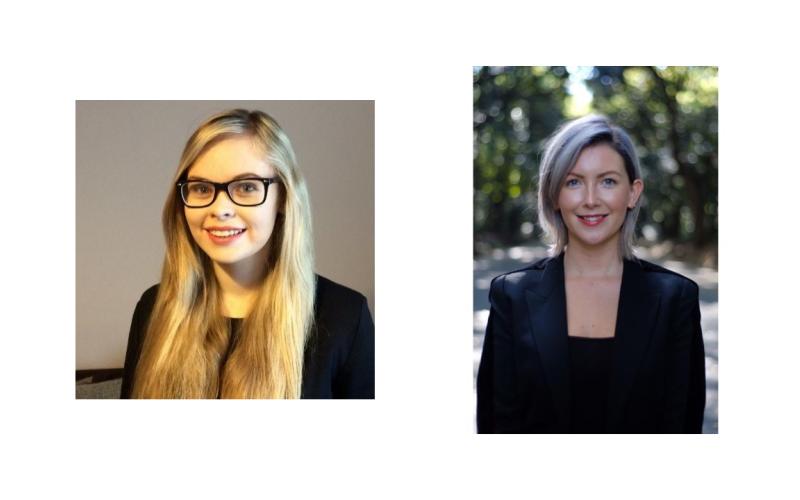International Women's Day 2022 - Featured Article
International Women’s Day, in which the achievements and aspirations of women across the globe are recognised and celebrated, takes place on March 8th. The IJCC has taken the opportunity of this occasion to shine a well-deserved spotlight on two of its female directors, Sarah Hickey and Aisling Barry.
Sarah holds the position of marketing manager at Whisk-e Ltd, an IJCC Corporate Member that specialises in the importation and distribution of whiskey, beer, spirits, liqueur, soft drinks, etc. throughout the country, placing her in the unique position of being in a leadership role at a Japanese company as both a foreigner and a young woman. Originally from Killarney, she came to Japan on the JET Programme and initially resided in Fukushima Prefecture for a period of four years. During that time she volunteered in the aftermath of the Great East Japan Earthquake, which allowed her to improve her Japanese language skills.
Aisling, a graduate of Dublin City University who hails from County Cork, arrived in Japan on the JET Programme as well, though not before undertaking a year studying abroad in Kyoto. She is now a Coordinator of International Relations at Kamaishi City, Iwate Prefecture, in addition to her role at the IJCC. Now in her fifth year in JET, she is contemplating her future career trajectory. This path will likely involve working for weConnect, an IJCC Corporate Member that assists overseas companies with the logistics of entering the Japanese market, which she presently works for part-time while also studying for a Master’s Degree. If that were not enough, Aisling became a mother for the first time a year ago, and has managed to effectively balance the double demands of her domestic and professional responsibilities.
Cultural Differences and Expectations
One aspect of working in Japan that both directors commented upon was the ingrained system of age hierarchies. Having lived in San Francisco prior to her arrival in Japan, Sarah had some experience of expat life. Yet the sheer contrast of living in a non-English speaking society gave her pause for thought. She found it initially difficult to acclimatise herself to the innermost intricacies of the Japanese office environment, but has ultimately grown and thrived in her field. She believes that her youth was more of a barrier than her gender when she first arrived, but is now confident in her element.
The issue of intercultural communication is one that Sarah and Aisling have similar experiences relating. They have both found that exchanges with the kacho, who tends to be male in most cases, invariably flow more smoothly in the context of a nomikai. Aisling noticed that her nomikais charged lower fees for women compared to men, perhaps under the rationale that women tend to eat and drink less than their male counterparts.
Sarah speaks highly of Whisk-e’s ethos and ambiance, describing the atmosphere created by the management as welcoming and understanding. She concludes that mutual trust and respect are the best foundations upon which to build good relations, and these traits transcend the boundaries of nationality and gender.
The Strength of Japanese Women
Japanese women have increasingly asserted themselves professionally, and Aisling points particularly to Tokyo Governor Yuriko Koike as a stellar example of female leadership in times of challenge. Governor Koike’s decisive command during the height of the global pandemic made a strong impression on her. She also points to the example of Seiko Hashimoto, the politician and former Olympian who served as President of the Tokyo 2020 Organising Committee, as an inspiring figure of authority and success.
Conversely, Sarah expresses admiration for a leading figure in the private sector. Kathy Matsui, a Harvard graduate who became chief Japan strategist for Goldman Sachs, is credited for being the driving force behind the concept of womenomics; the empowerment and promotion of women in the Japanese workplace. Sarah sees this initiative as a force for positive change in our society that will have beneficial ramifications for women from all walks of life.
In the future, Sarah envisions herself facilitating the entry of businesses into the Japanese market and developing marketing strategies for them as well as would like to create her own beverage brand someday. Aisling sees herself eventually making the move to the Greater Tokyo Area to further her promising career at weConnect, but anticipates a reluctant farewell to the idyllic surroundings of Iwate and its comparatively low cost of living.
We would like to thank both Aisling and Sarah for taking the time to speak with us, and wish them even greater success in the years ahead.
Written by Ciaran Lawler, IJCC Member

